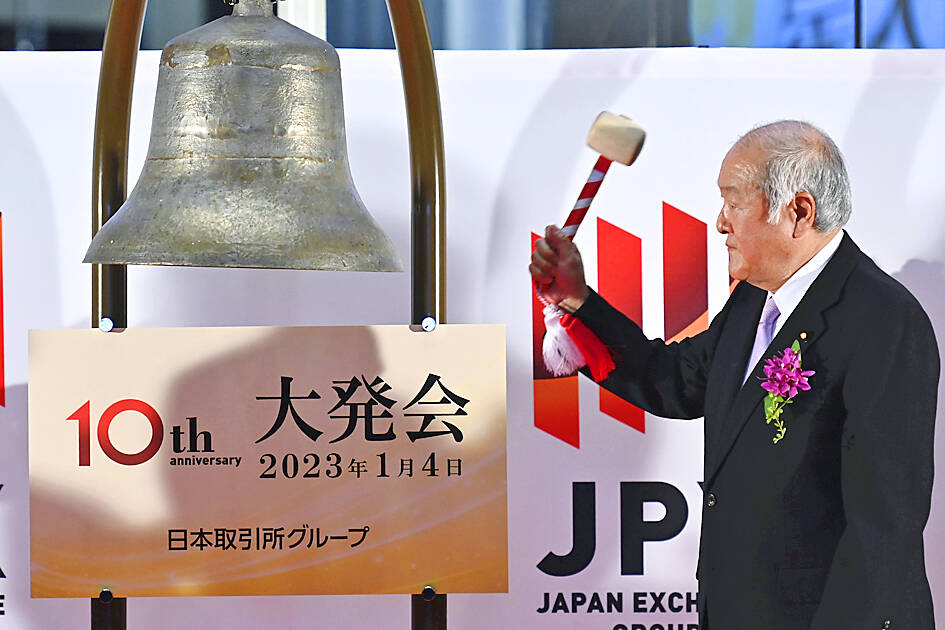Japan’s finances are becoming increasingly precarious, Minister of Finance Shunichi Suzuki warned on Monday, just as markets test whether the central bank can keep interest rates ultra-low, allowing the government to service its debt.
Japan’s public debt is more than double its annual economic output, by far the heaviest burden in the industrialized world.
The government has been helped by near-zero bond yields, but bond investors have recently sought to break the Bank of Japan’s (BOJ) 0.5 percent cap on the 10-year bond yield, as inflation runs at 41-year highs, double the central bank’s 2 percent target.

Photo: AP
“Japan’s public finances have increased in severity to an unprecedented degree as we have compiled supplementary budgets to respond to the coronavirus and similar issues,” Suzuki said in a policy speech starting a session of parliament.
Suzuki reiterated the government’s aim to achieve an annual budget surplus — excluding new bond sales and debt-servicing costs — in the fiscal year to March 2026.
The government, however, has missed budget-balancing targets for a decade. The Ministry of Finance estimates that every 1 percentage point rise in interest rates would boost debt service by ¥3.7 trillion (US$28.4 billion) to ¥32.5 trillion (US$249.9 billion) for the 2025/2026 fiscal year.
“The government will strive to stably manage Japanese government bond [JGB] issuance through close communication with the market,” he said. “Overall JGB issuance, including rolling over bonds, remains at an extremely high level worth about ¥206 trillion. We will step up efforts to keep JGB issuance stable.”
“Public finance is the cornerstone of a country’s trust. We must secure fiscal space under normal circumstances to safeguard trust in Japan and people’s livelihood at a time of emergency,” Suzuki added.
Japanese Prime Minister Fumio Kishida echoed Suzuki’s resolve to revive the economy and tackle fiscal reform. He stressed the need for a positive cycle of growth led by corporate profits and private consumption, which accounts for more than half of the economy.
“Wage hikes hold the key to this virtuous cycle,” Kishida said in his policy speech. He vowed to push labor reform to create a structure that allows sustainable wage growth and overcomes the pain of rising living costs.
“First of all, we need to realize wage growth that exceeds price increases,” Kishida added, pledging to also boost childcare support, and push investment and reform in areas such as green and digital transformation.
The government would unveil a blueprint for “job-based” pay by June, Kishida said, calling the shift a matter of urgency for corporate growth.
“Regardless of age and gender, we will set up a system to provide support straight through from reskilling to changing jobs. We’ll look at retraining from a longer-term perspective,” he said.

Intel Corp chief executive officer Lip-Bu Tan (陳立武) is expected to meet with Taiwanese suppliers next month in conjunction with the opening of the Computex Taipei trade show, supply chain sources said on Monday. The visit, the first for Tan to Taiwan since assuming his new post last month, would be aimed at enhancing Intel’s ties with suppliers in Taiwan as he attempts to help turn around the struggling US chipmaker, the sources said. Tan is to hold a banquet to celebrate Intel’s 40-year presence in Taiwan before Computex opens on May 20 and invite dozens of Taiwanese suppliers to exchange views

Application-specific integrated circuit designer Faraday Technology Corp (智原) yesterday said that although revenue this quarter would decline 30 percent from last quarter, it retained its full-year forecast of revenue growth of 100 percent. The company attributed the quarterly drop to a slowdown in customers’ production of chips using Faraday’s advanced packaging technology. The company is still confident about its revenue growth this year, given its strong “design-win” — or the projects it won to help customers design their chips, Faraday president Steve Wang (王國雍) told an online earnings conference. “The design-win this year is better than we expected. We believe we will win

Chizuko Kimura has become the first female sushi chef in the world to win a Michelin star, fulfilling a promise she made to her dying husband to continue his legacy. The 54-year-old Japanese chef regained the Michelin star her late husband, Shunei Kimura, won three years ago for their Sushi Shunei restaurant in Paris. For Shunei Kimura, the star was a dream come true. However, the joy was short-lived. He died from cancer just three months later in June 2022. He was 65. The following year, the restaurant in the heart of Montmartre lost its star rating. Chizuko Kimura insisted that the new star is still down

While China’s leaders use their economic and political might to fight US President Donald Trump’s trade war “to the end,” its army of social media soldiers are embarking on a more humorous campaign online. Trump’s tariff blitz has seen Washington and Beijing impose eye-watering duties on imports from the other, fanning a standoff between the economic superpowers that has sparked global recession fears and sent markets into a tailspin. Trump says his policy is a response to years of being “ripped off” by other countries and aims to bring manufacturing to the US, forcing companies to employ US workers. However, China’s online warriors